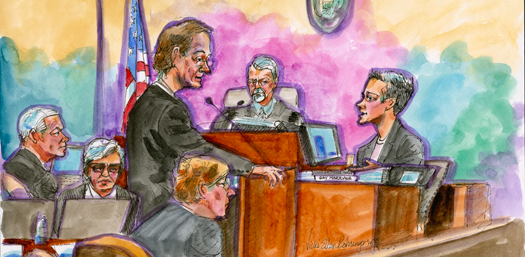Marriage News Blog

On the sixth day of trial, University of Massachusetts Amherst economics professor M.V. Lee Badgett testified about economic and demographic issues related the gay and lesbian couples and their children.
 Professor Badgett explained how Proposition 8 inflicts substantial economic harm on gay and lesbian families and the State of California and its local governments.┬Ā She also testified that allowing gay and lesbian couples to marry would not have any adverse impact on heterosexual couplesŌĆÖ marriages.
Professor Badgett explained how Proposition 8 inflicts substantial economic harm on gay and lesbian families and the State of California and its local governments.┬Ā She also testified that allowing gay and lesbian couples to marry would not have any adverse impact on heterosexual couplesŌĆÖ marriages.
Professor Badgett is the author of When Gay People Get Married: What Happens When Societies Legalize Same-Sex Marriage and Money, Myths, and Change: The Economic Lives of Lesbians and Gay Men.
Testimony Highlights
ŌĆ£Prop 8 as inflicted substantial economic harm on same-sex couples and their children who live here in California.ŌĆØ
ŌĆ£Proposition 8 has imposed some economic losses on the State of California and on counties and municipalities.ŌĆØ
ŌĆ£[L]etting same-sex couples marry would not have any adverse effect on the institution of marriage or on different-sex couples.ŌĆØ
ŌĆ£[S]ame-sex couples are very similar to different-sex couples in most economic and demographic characteristics.ŌĆØ
ŌĆ£In thinking about the economic harm that those couples suffer from not being able to marry, the veryŌĆösome very specific, tangible financial effects would be that they may lack access to health insurance and other employment benefits because their relationship would not be recognized by their employers.
ŌĆ£They are likely to be paying higher state income taxes. If they are fortunate enough to have an employer who covers their domestic partner’s benefitsŌĆöor their unregistered domestic partner’s benefits, I should say, then they will have to pay income taxes on that, that benefit.
ŌĆ£They will not be able to file jointly. And the calculations that I have done suggest that a substantial number of couples would pay higher taxes because they are not allowed to file jointly.ŌĆØ
ŌĆ£Same-sex couples wish to marry for many of the same reasons that opposite-sex couples marry.ŌĆØ
ŌĆ£[T]o the couple, to the two individuals and the couple themselves, marriage has much more meaning than something like domestic partnership, which has a much more clinical and business-like kind of sound to it to many couples.ŌĆØ
ŌĆ£[I]ndividuals clearly not only see marriage as something that’s more valuable that comes with added characteristics over some alternative status, but the alternative status in and of itself is devalued because it’s seen as sending a message of inferiority.ŌĆØ
ŌĆ£The state has some safety net programs for people who have low incomes. And if some of the effects on same-sex couples tend to reduce their incomes, then that will make them more likely to need and be eligible for those means-tested programs that are paid for by the state.ŌĆØ
ŌĆ£[O]ne of the important benefits of marriage from employers is the coverage of spouses on health insurance plans. And to the extent that couples are not givenŌĆöthat same-sex couples cannot have access to those same benefits, then there will be uninsured people who might need to sign up for some of theŌĆöfor the state’s version of Medicaid or the state children’s health insurance program, and that will increase costs to the state; or uncompensated care by uninsured individuals might also be costly to the state.ŌĆØ
